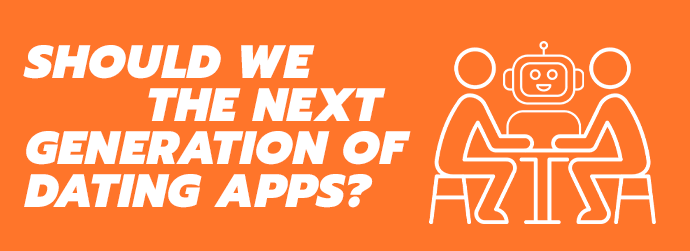
Flexibility over flawlessness kept ‘Good Morning America’ from going bad
January 31, 2025
GK’s Guide to Nailing That Wedding Toast!
June 3, 2025Should We Fear the Next Generation of Dating Apps?

By: Michael Chad Hoeppner
Published: April 8th, 2025
Have you ever used Tinder? C’mon – be honest. It’s just you (reader) and me (writer) and your private confessions.
DATING APPS: A THOUGHT EXPERIMENT
If so, ever have the experience of finally meeting a potential match, and then being shocked at the sound of their voice – either on the phone or in person?
Via text, they seemed like a witty, well-spoken, gravitas-possessing bon vivant – and then when you heard them speak IRL you wished you had swiped left?
Well guess what? In the future, the app might be able to “fix” their voices (and words!) for them.
You remember Steve Martin seducing Daryl Hannah from behind the leaves of the trees in Roxanne (a remake of Cyrano be Bergerac), his voice and poetry doing the heavy lifting for his verbally stunted, over-muscled colleague? That’s what the new AI dating app of the future could do – take care of all that difficult thinking and speaking that used to be required. Cue the commercial:
“Is your voice a squeaky music box? No matter! Our filter will transform you into a flawless combo of Al Green, Barry White, Daniel Day Lewis, and Harry Styles! Can’t think of something witty? Don’t worry; our LLM can search the catacombs of all history’s wooing words in nano-seconds and spit out something pithy. Or even better, just activate our voice software to speak those flirty bon mots for you. You won’t have to do any of that annoying thinking, speaking, and reacting!”
Does my tongue-in-cheek scenario of Our Dating Future seem too far-fetched? Or perhaps it’s not far-fetched enough given the speed of AI’s development.
WHY TO BE SKEPTICAL ABOUT THE AI FUTURE
What am I driving at in this sarcasm-laced Good Talk? You (and by that, I mean we) should defend and preserve our ability to choose and speak words.
Why do I say this?
First, I am neither a Doomer nor an Accelerant; I do not know enough about either technology nor sociology to reliably predict if we’re headed towards Skynet or Utopia.
But I do know a thing or two about communication, and I predict that you should hold on fast and tight to your current ability to choose words.
First, a history lesson, given by a non-historian without fact checking.
Technological revolutions often promise one future, then deliver a very different one.
- Labor-saving devices (laundry machines, sewing machines, etc.) were going to displace so many tasks that “people won’t have anything to do.”
- Nuclear power was going to unlock energy “so cheap we won’t have to meter it.”
- Social media was going to spread democracy around the globe.
- Free you from menial tasks so you can use your brain for truly big-picture thinking!
- Be a creativity enhancement, offering you countless rough drafts to start the creation journey!
And yet…
Remember your sense of direction before GPS?
Or your attention span before Notifications?
Or your research skills before Search? (Quick: write a bibliographic citation with all the correct formatting.)
Generative AI could similarly erode your ability to think and write.
AI accelerants might dismiss my defense of learning, sorting, choosing, and speaking words: “Even if humans don’t sharpen their brains on the whetstone of words,” they might protest, “Humans will develop superior ways to train and unleash our minds. AI can free the human brain to uncover its true genius, unburdened and untethered from words! Words are limited, crude vehicles, like janky old cars, trying to get ideas from one place to another on clogged, pot-holed roads. Why not just fly? AI-augmented humans could communicate without words. It could almost be telepathy even!”
Potentially. But what if the ideas we endeavor to share telepathically are…well…dumb? If we outsource that time-consuming, inefficient work of speaking and writing, who is to say we will end up having anything worth speaking or writing about?
Think of just some of what we gain with the act of choosing and sharing words:
1. Speaking is Decision-making
Take a moment to pay tribute to the astonishing, dazzling, dizzying genius of the brain’s decision-making prowess on display when you speak. I don’t mean like “should I tell him he has spinach between his teeth or not?!” I mean the incredible real-time activity your brain executes as it – word by word and phrase by phrase – determines what it wants to communicate. The cognitive part of speaking (don’t forget – there’s a physical part too… if you’ve forgotten let me introduce you to a little book that will remind you) is really just a fast yet profound act of decision-making, hundreds and thousands of time in a single conversation, meeting or presentation.
2. We Think through Speaking
Ever tell a friend, “I just need to talk this out?” Many, many times in our life we use the act of speaking not as an opportunity for pronouncements but as a thinking aid: it helps us determine what we think. What happens when you stop using that muscle?
3. Feeling
You know that cathartic feeling you get after you reveal something important, about which you had some trepidation? Would you feel that same way if AI wrote the script and you just recited it? No!
Everyone is very busy explaining how AI won’t replace people; it will just help the smart/savvy/industrious/agile/
What if you forget how to form a complex thought? Sounds outlandishly pessimistic, right? And yet Ivy league students have gotten worse at reading and writing.
A different way to say the same thing is this: hard things (like writing well and speaking eloquently) are worth doing – and learning how to do – in part because doing hard things is good for you and good for your brain! It’s not altogether different than the point of a recent David Brooks column about what actually fosters a life well-lived.
So how can you keep those hard-won skills (like writing, thinking, and speaking) sharp! Here’s two quick CTAs to try today:
- Instead of relying on Grammarly, Copilot, or a GPT to write things for you, rely on your mouth instead. Do the exercise I teach called Outloud Drafting (it’s featured in Chapter 16 of my book). It’s exactly like it sounds: write stuff by talking it out. Use voice-to-speech transcription software and just talk out the thing you’re trying to write. I’ve been teaching this technique for years; others have been writing about it for some time; and…there’s still a good chance you’ve never tried it! Let the fear of your soon-to-be-complete reliance on AI be the driver to get you to finally try it.
- Write something that’s not just functional. The temptation to outsource all our writing to AI is so tempting in part because so much of what we write is mind-numbingly functional: update emails; business proposals; procedural overviews. In other words, the outputs of writing don’t feel all that precious to us. What if you changed that? How about handwriting a note to someone? Why not dash down the hypothetical preface to your forthcoming memoir? What about a time capsule to your kids, partner, friend or family member? AI isn’t nearly as helpful with any of those tasks. So relish those tasks, and make time to do a few more of them!
The complexity and dexterity of human communication – both spoken and written – is one of the primary things that distinguish us from other species (don’t take my word for it; Yuval Noah Harari says so, too).
Relinquish the ownership of those skills at your peril.
~Michael Chad Hoeppner






